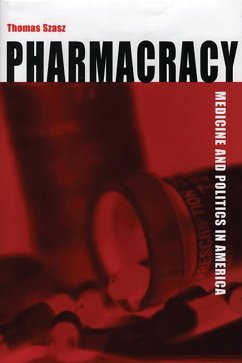In recent decades, American medicine has become increasingly politicized and politics has become increasingly medicalized. Behaviors previously seen as virtuous or wicked, wise or unwise are now dealt with as healthy or sick--unwanted behaviors to be controlled as if they were health issues. The modern penchant for transforming human problems into diseases and judicial sanctions into treatments, replacing the rule of law with the rule of medical discretion, leads to the creation of a type of government social critic Thomas Szasz calls pharmacracy.
Medicalizing troublesome behaviors and social problems is tempting to voters and politicians alike: it panders to the people by promising to satisfy their needs for dependence on medical authority and offers easy self-aggrandizement to politicians as the dispensers of more and better health care. Thus, the people gain a convenient scapegoat, enabling them to avoid personal responsibility for their behavior. The government gains a rationale for endless and politically expedient wars against social problems defined as public health emergencies. The health care system gains prestige, funding, and bureaucratic power that only an alliance with the political system can provide.
However, Szasz warns, the creeping substitution of pharmacracy for democracy--private medical concerns increasingly perceived as requiring a political response--inexorably erodes personal freedom and dignity. Pharmacracy: Medicine and Politics in America is a clear and convincing presentation of this hidden danger, all too often ignored in our health care debates and avoided in our political contests.
Medicalizing troublesome behaviors and social problems is tempting to voters and politicians alike: it panders to the people by promising to satisfy their needs for dependence on medical authority and offers easy self-aggrandizement to politicians as the dispensers of more and better health care. Thus, the people gain a convenient scapegoat, enabling them to avoid personal responsibility for their behavior. The government gains a rationale for endless and politically expedient wars against social problems defined as public health emergencies. The health care system gains prestige, funding, and bureaucratic power that only an alliance with the political system can provide.
However, Szasz warns, the creeping substitution of pharmacracy for democracy--private medical concerns increasingly perceived as requiring a political response--inexorably erodes personal freedom and dignity. Pharmacracy: Medicine and Politics in America is a clear and convincing presentation of this hidden danger, all too often ignored in our health care debates and avoided in our political contests.


